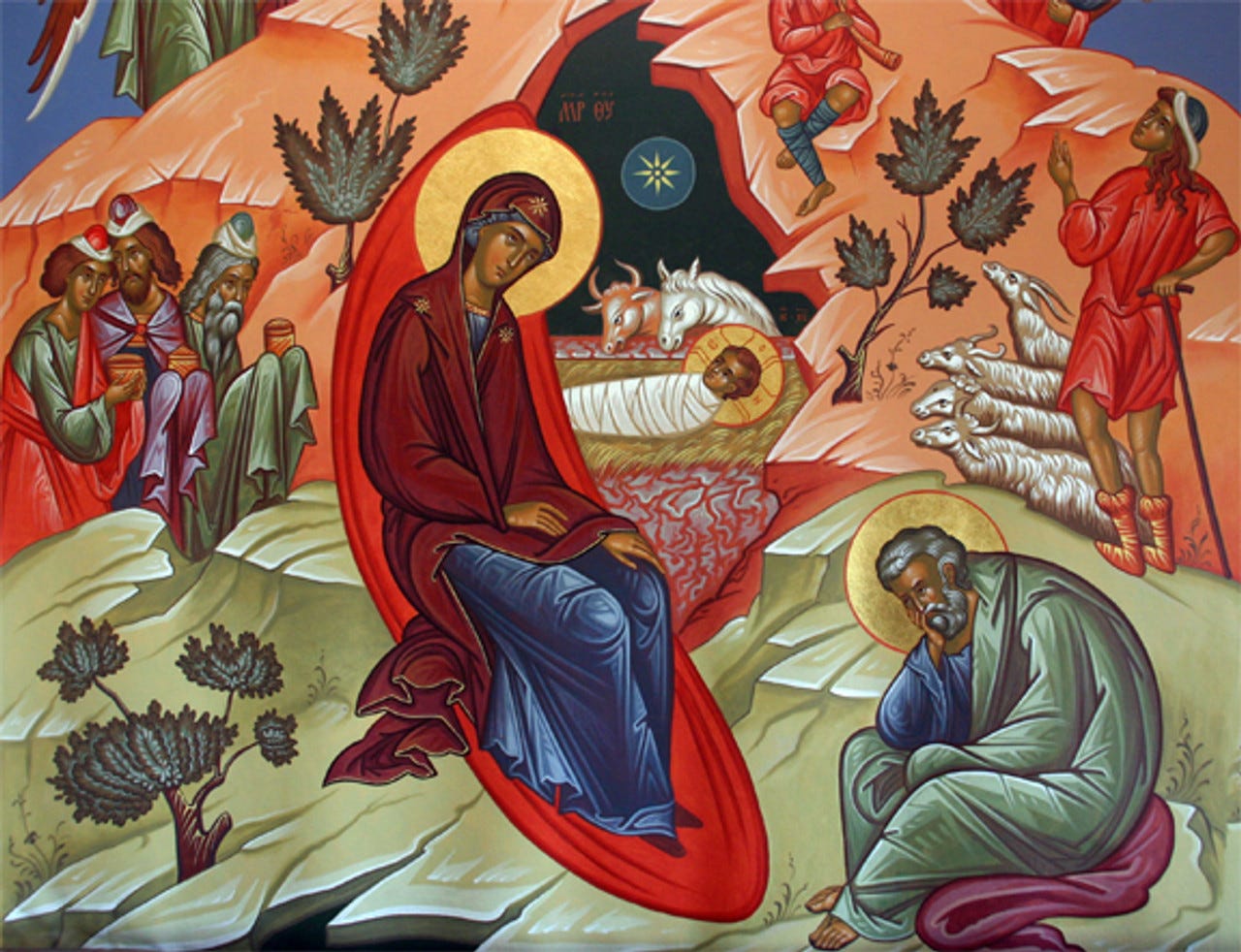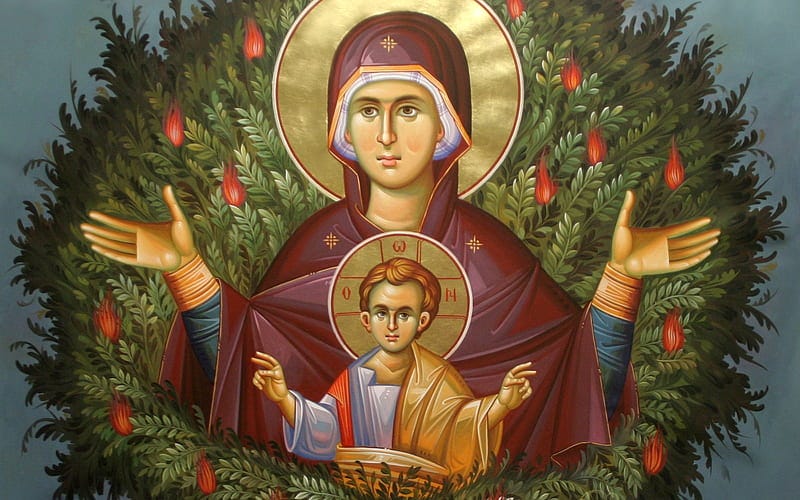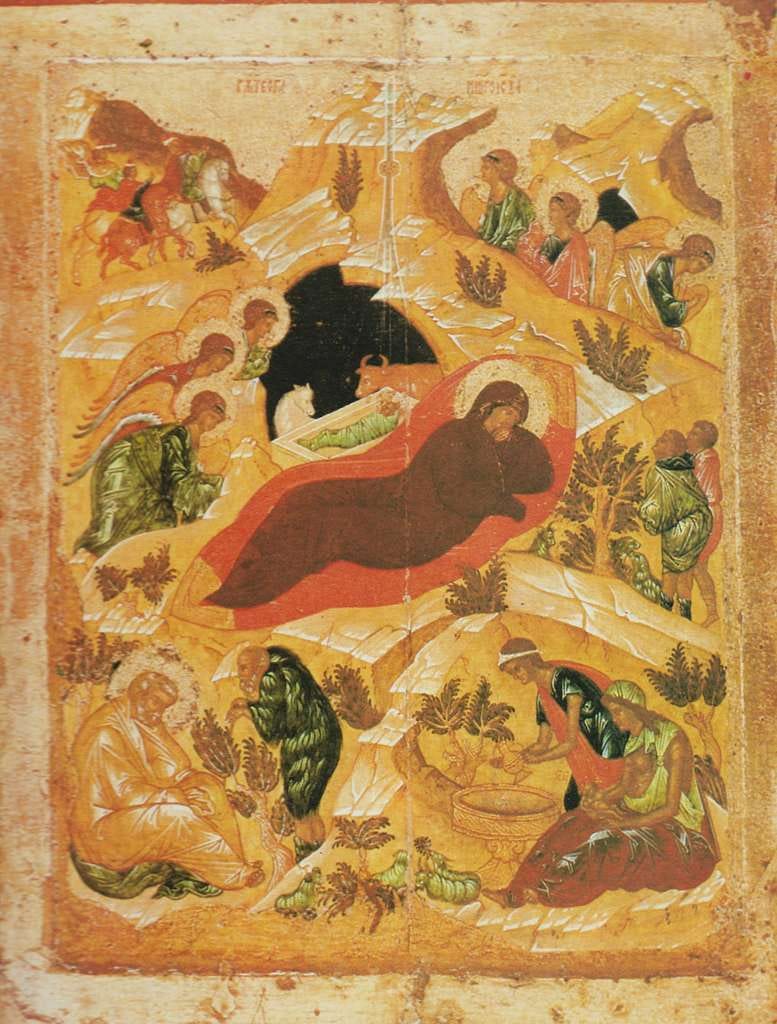Have Yourself A Very 'Patristic' Christmas!
The Top 5 Church Father Quotes & Homilies on the Nativity of our Lord
The Church Fathers loved Christmas and preached sermons about this great paradox of God becoming a baby to dwell among us in a lowly manger. Here are excerpts from five of my favorite Christmas homilies (so far) by the church fathers:
1. St. Augustine of Hippo (354-430 AD)
“So then, let us celebrate the birthday of the Lord with all due festive gatherings. Let men rejoice, let women rejoice. Christ has been born, a man; he has been born of a woman; and each sex has been honored. Now therefore, let everyone, having been condemned in the first man, pass over to the second. It was a woman who sold us death; a woman who bore us life. The likeness of the flesh of sin (Rom 8:3) has been born, so that the flesh of sin might be cleansed and purified. And thus it is not the flesh that is to be faulted, but the fault that must die in order that the nature may live; because one has been born without fault, in whom the other* who was at fault may be reborn.
Rejoice, you just (Ps 33: 1); it is the birthday of the Justifier. Rejoice, you who are weak and sick; it is the birthday of the Savior, the Healer. Rejoice, captives; it is the birthday of the Redeemer. Rejoice, slaves; it is the birthday of the one who makes you lords.Rejoice, free people; it is the birthday of the one who makes you free. Rejoice, all Christians; it is the birthday of Christ.”1
2. St. Basil the Great (330-379 AD)
“The actual, first nativity of Christ, His actual birth from all eternity in the bosom of His Father, must be venerated in silence. We should never permit our mind to investigate this mystery. Since time and space did not exist, since no form of expressions had yet been created, since there is not a single eyewitness, nor anyone who can describe this eternal birth, how can reason form any concept for reflection? How can the tongue give expression to thoughts that cannot be formulated? The Father was, and the Son was born! Do not say: "when?" but rather leave that question unasked. Do not ask "how?" for there is not answer! For the word "when" suggests time, and "how" suggests birth in the flesh...God is on earth, He is among men, not in the fire nor amid the sound of trumpets; not in the smoking mountain, or in the darkness, or in the terrible and roaring tempest giving the Law, but manifested in the flesh, the gentle and good One dwells with those He condescends to make His equals! God is in the flesh, not operating from a distance, as did the prophets, but through Him human nature, one with ours, He seeks to bring back all mankind to Himself.”2
3. St. Jerome (340-420 AD)
“Since we have touched on many things and have heard the Babe crying in the manger and have adored him there, let us continue our adoration of him today. Let us pick him up in our arms and adore him as the Son of God, Mighty God who for so long a time thundered in heaven and did not redeem humanity, cries, and as a babe redeems human. Why do I say all this? Because pride never brings salvation, but humility does…As long as the Son of God was in heaven, he was not adored; he descends to earth and is adored.” (Interesting closing remark: “Let us be ready now to give our attention to the Bishop and ernestly take to heart what he has to say on what I have left out. Let us bless the Lord, to whom be glory forever and ever. Amen.”)3
4. St. John Chrysostom (347-407 AD)
St. John Chrysostom (the golden mouth preacher) connects receiving the fiery presence of Christ in the Eucharist with His coming in the manger at Christmas:
"O Lord my God, I know that I am not worthy nor sufficiently pleasing that Thou shouldst come under the roof of the house of my soul, for it is entirely desolate and fallen in ruin, and Thou wilt not find in me a place worthy to lay Thy head. But as Thou didst humble Thyself from on high for our sake, so now humble Thyself to my lowliness. As Thou didst deign to lie in a cavern, in a MANGER of dumb beasts, so now deign to enter into the manger of my beastly soul, and into my soiled body…
Let the fiery coal of Thy most pure Body and Thy most precious Blood bring me sanctification, enlightenment and strengthening of my lowly soul and body, relief from the burden of my many transgressions, protection against every action of the devil, repulsion and victory over my wicked and evil habits, mortification of my passions, accomplishment of Thy commandments, increase of Thy divine grace, and inheritance of Thy Kingdom.” (Second Prayer of St. John Chrysostom in the Orthodox Pre-Communion Prayers)
If you would like to listen to a full homily by St. John Chrysostom on Christmas, see below!
5. St. Peter Chrysologus (406-450 AD)
“Why then, man, are you so worthless in your own eyes and yet so precious to God?…
Was not this entire visible universe made for your dwelling?… He has made you in his image that you might in your person make the invisible Creator present on earth; he has made you his legate, so that the vast empire of the world might have the Lord’s representative. Then in his mercy God assumed what he made in you; he wanted now to be truly manifest in man, just as he had wished to be revealed in man as in an image. Now he would be in reality what he had submitted to be in symbol.
And so Christ is born that by his birth he might restore our nature. He became a child, was fed, and grew that he might inaugurate the one perfect age to remain for ever as he created it. He supports man that man might no longer fall. And the creature he had formed of earth he now makes heavenly; and what he had endowed with a human soul he now vivifies to become a heavenly spirit. In this way he fully raised man to God, and left in him neither sin, nor death, nor travail, nor pain, nor anything earthly, with the grace of our Lord Christ Jesus, who lives and reigns with the Father in the unity of the Holy Spirit, now and for ever, for all the ages of eternity. Amen”
Also, our friends over at Patristix have an amazing list of Christmas episodes (13) that you should definitely listen to! They are doing beautiful work with mini-teaching episodes that help people discover Christ as well as the heart of ancient Christianity. Please share them with others.
Bonus: C.S. Lewis (A Christmas Sermon to Pagans)
“It looks to me, neighbours, as though we shall have to set about becoming true Pagans if only as a preliminary to becoming Christians… If the modern post-Christian view is wrong—and every day I find it harder to think it right—then there are three kinds of people in the world. (1) Those who are sick and don’t know it (the post-Christians). (2) Those who are sick and know it (Pagans). (3) Those who have found the cure. And if you start in the first class you must go through the second to reach the third. For (in a sense) all that Christianity adds to Paganism is the cure. It confirms the old belief that in this universe we are up against Living Power: that there is a real Right and that we have failed to obey it: that existence is beautiful and terrifying. It adds a wonder of which Paganism had not distinctly heard—that the Mighty One has come down to help us, to remove our guilt, to reconcile us.
All of the world (even in Japan, even in Russia) men and women will meet on December 25th to do what is a very old-fashioned and, if you like, a very Pagan thing—to sing and feast because a God has been born. You are uncertain whether it is more than a myth. Well if it is, then our last hope is gone. But is the opposite explanation not worth trying?
Who knows but that here, and here alone, lies your way back not only to Heaven, but to Earth too, and to the great human family whose oldest hopes are confirmed by this story that does not die?”
Source: Homily 184 from SERMONS III/6 (184-229Z) on the Liturgical Seasons; The Works of St. Augustine: A Translation for the 21st Century. Published in the United States by New City Press. 86 Mayflower Avenue, New Rochelle, New York 10801 ©1993 Augustinian Heritage Institute)
Source: St. Basil “On the Incarnation"
Source: The Homilies of Saint Jerome, ed. Marie Ligouri Ewald, in The Fathers of the Church, vol. 57. Washington DC: Catholic University of America Press, 1966.





